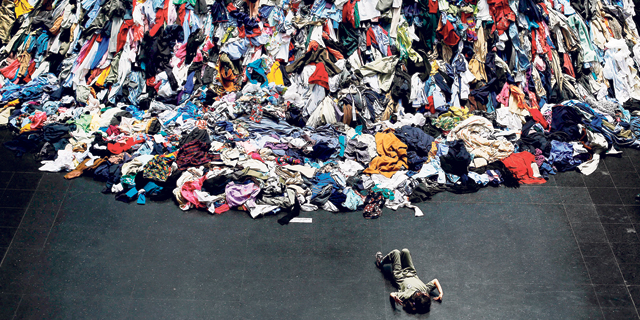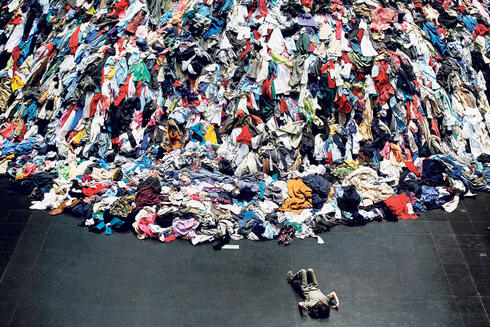
Opinion
Can fashionable also be sustainable?
"The use of novel technologies in the fashion industry to reduce its negative impact on the environment raises a number of non-trivial ethical, legal and social considerations," writes Dov Greenbaum
It’s in the name! The fashion industry demands that we consume their products for only a short period of time, and then dispose of them when they are no longer *fashionable*. An industry that dictates that something that is otherwise fully functional is nevertheless disposable, as it is out of fashion, is environmentally untenable. There is a need for political, economic, legal, and social solutions.
Israel is not yet a leader in sustainable fashion - the idea that fashion need not be polluting or wasteful - but it could be.
How bad is the current situation? A recent article by the World Economic Forum on sustainable fashion, citing a United Nations report, noted that the fashion industry produces up to 8% of global carbon emissions (the number varies, but it's consistently bad), and is a huge contributor to water pollution as well as landfills, in addition to other horrible statistics associated with one the least environmentally friendly industries.
While arguably it is the industry, and not the consumers that are principally responsible for these negative climate effects, ultimately consumers have the power to vote with their feet if they are truly interested in working to limit climate change rather than slavishly following the whims of the editors of fashion magazines.
In the meantime, there are a number of Israeli fashion designers and startups that are working toward making the fashion world a better, more sustainable, place. In a recent Vogue article, discussing up and coming Israeli fashion designers, the authors talk about at least one Israeli artist, Adi Karni, who is focusing on sustainable fashion technology including 3D printing technologies and NFTs.
Similarly, the Israeli/Italian material sciences company Balena, founded by David Roubach, recently debuted its eco-chic BioCir Slides in Tel Aviv. According to the company’s recent announcement, these slides are made of a proprietary biodegradable plastic. The shoes are designed to be disposed of at specific locations around Tel Aviv so that they can be properly bio-degraded rather than added to the landfills.
Similarly, Unless, a US-based collective of innovators, engineers, artists, and activists in the fashion industry, recently announced that it was creating a regenerative sneaker made entirely from plants and minerals. Like Balena, the shoes can be returned to be recycled by the company. In addition to the use of Balena’s novel material, other companies have looked to plastic bags, mushrooms, and even shrimp biowaste, among other inputs as leather substitutes.
While these impact-directed fashion companies have commendable business plans, the recycling of the products seems to be somewhat reliant on the continuation of the company. Similar to a recently reported concern with regard to brain machine interfaces companies that go out of business leaving their customers with unsupported implanted devices, there needs to be broad policy efforts to make sure that these innovative types of clothing remain recyclable long after their companies have become defunct.
Recycling or upcycling has become a mantra in the world of sustainable fashion. In some cases, the upcycling is clearly exceedingly inefficient, and seems to be simply a ploy to greenwash an otherwise environmentally unfriendly company. In other cases, there are legitimate efforts to develop businesses based solely on upcycling, such as one company’s effort to convert discarded flipflops into art or another’s to convert discarded fish skins into marketable leather products. Others, like Israeli firm KitePride, in addition to upcycling kitesurfing sails into fashionable bags, has a second commendable goal of also providing jobs to survivors of prostitution and human trafficking.
Fashion companies need not include upcycling in their business model to be sustainably-oriented. The virtual world, including the much-maligned metaverse, provides eco-friendly opportunities for fashion businesses to interact with their customers via a significantly diminished carbon footprint. This can include the use of 3D body scanning to create bespoke clothing that fits and lasts longer and doesn’t lead to overstock of non-fitting clothing.
VR and augmented reality can also let customers virtually try on clothing either online or in stores. Clothing that fits is more likely to not be returned and disposed of; much of the ill-fitting clothing that is returned to retailers is often simply passed on to landfills rather than being restocked on shelves.
Related articles:
We have already written about the value of using virtual clothing, such as NFTs to limit the waste produced by the fashion industry while still allowing many to scratch their fashion itch in social media.
The clear value to society notwithstanding, the use of novel technologies in the fashion industry to reduce its negative impact on the environment raises a number of non-trivial ethical, legal and social considerations. Considering that much of the fashion production workforce resides in poor developing nations, technological unemployment, i.e., job loss due to technological innovation, could have massive social and economic repercussions for many poor families suddenly finding themselves out of their jobs.
Another concern relates to privacy. Typically, when purchasing clothing at a retail outlet, the store may obtain at most, a name, address, clothing size, and payment information. The much more personally intrusive virtual sizing can disclose more intimate sizing data as well as a person’s gender, ethnicity, race, and even perhaps potential medical conditions – all extractable from the image. And that’s when they are being employed as advertised. It is also possible that these services may also discreetly be measuring other biometric information that would otherwise be provided extra privacy protection under many data protection regimes.
Legally, there is also a need for industry-wide standards and terminologies to prevent the aforementioned greenwashing and perhaps even overt false advertising to trick customers into thinking that the brand they are purchasing is actually socially conscious. Of course, without real and reliable enforcement, these standards will not actually help the consumer make truly educated choices.
Moreover, strict definitions could also hurt actually socially conscious retailers. Consider the current efforts to prevent plant-based meat products from being labeled as meat. While ostensibly done to protect the consumer, arguably the underlying real reason is to protect the entrenched meat industry from encroachment by progressive brands. Similarly, if plant or fish-based leathers are prohibited from describing their product as leather, consumers might not purchase these more environmentally friendly products.
Prof. Dov Greenbaum is the director of the Zvi Meitar Institute for Legal Implications of Emerging Technologies at the Harry Radzyner Law School, at Reichman University. The Zvi Meitar Institute will be hosting a conference on January 8th at Reichman University on issues relating to sustainable fashion.
